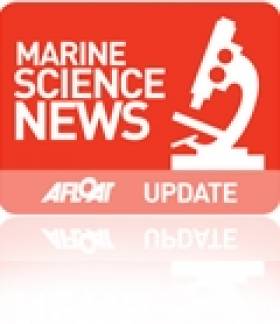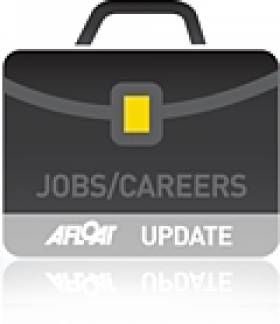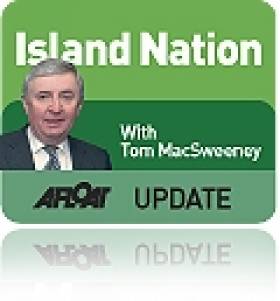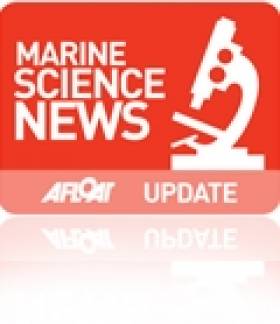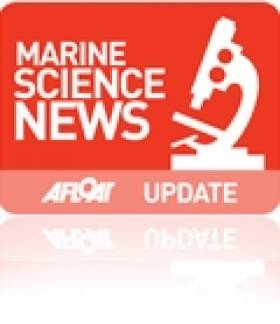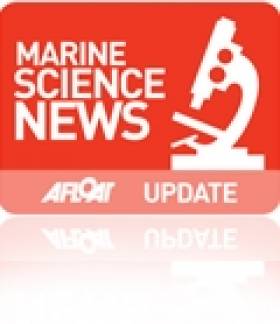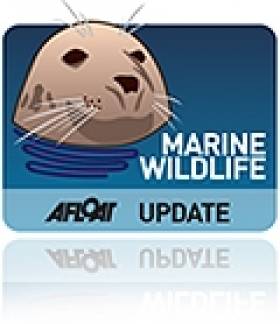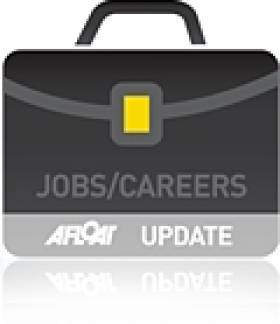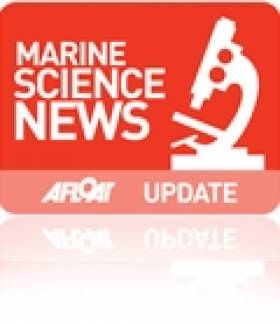Displaying items by tag: Marine Institute
Irish to Lead Europe in Research Vessel Productivity
These figures compare favourably with our European counterparts, reflecting a high level of activity on national and international research and monitoring programmes.
Work duties in 2011 for the Galway based vessels will range from fisheries surveys to underwater mapping and from climate studies to deepwater surveys with the remotely operated submersible ROV Holland 1. The work schedule will facilitate training missions and to carry out essential maintenance work on Ireland's network of data buoys that, in parallel to their research function, supply the vital information on which weather and shipping forecasts are based.
The increased activity of the research vessels reflects the growing imperative to understand and sustainably manage the economic potential of our offshore marine territories, an area over ten times that of Ireland itself.
A major role of the ships' workload will be commercial fish stock assessments. Together they are to devote 141 days on stock surveys in support of the sustainable management of Ireland's fisheries.
The RV Celtic Voyager will conduct underwater television surveys of valuable prawn stocks off the Aran Islands, the Irish and Celtic Seas, working on blue whiting, a survey of herring stocks in the north-west. In addition a comprehensive 54-day annual Irish Groundfish Survey which will take place in stages all around the Irish coast from September to December.
The survey will be the largest undertaken by an Irish research vessel and is essential to providing the scientific data used to inform the annual quota negotiations required in Brussels each year.
For the 2011 schedule for both vessels is available to view by clicking HERE and the Maritime Institute website click this link.
At 65.5m RV Celtic Explorer (2,425grt) accommodates 35 personnel and up to 21 scientists and 31.4m RV Celtic Voyager (340grt) with up to 8 scientists and a maximum endurance of 14-day days. For detailed technical specifications of the Dutch built vessels, RV Celtic Explorer, click here to download a PDF file and for the RV Celtic Voyager click here
For further information contact: Dr John Joyce, Communications Manager of Marine Institute on 087 2250871
Student Positions in Maritime Summer Bursary Scheme
The Bursary programme is a work experience scheme aimed at undergraduates of Universities, Institutes of Technology and National Institutes for Higher Education. The Bursary Scheme is strictly limited to undergraduates who have completed 2 years study in a relevant discipline. Below is a description of the positions and other details.
IMDO – Maritime Economics (2)
Two students are required to provide direct assistance in the key programmes of the Irish Maritime Development Office. The key programme areas include Business Development and Shipping Market Analysis supported by a strategic marketing programme. Two students will be required to co-ordinate research on market and economic issues in the Irish maritime industry and analyse data on competitor maritime jurisdictions.
The successful students will gain a broad knowledge of the maritime industry, international trade, maritime finance, and national shipping development. They will also gain a valuable insight into the national and international maritime transport sector and associated business services, along with experience in collating information and critical analysis.
The student should have good communication and analytical skills. An interest in international trade, business, economics or shipping and logistics is desirable but not essential. The student should be able to work independently and also as part of a team. The bursary will be based in MI-Harcourt Street.
For further information on the busary scheme you can download a PDF file from here and also download a PDF application form here. In addition information in general about the IMDO can be found by logging onto www.imdo.ie and the Marine Institute at www.marine.ie
Giving Away a Billion from the Sea
I had to read the figures twice to make sure that I was seeing them correctly. The second reading made me even more angry than the first.
They were, at last, a definitive figure of how much the stupidity of Irish politicians and the ignorance and disregard of the maritime sphere by the Government have cost this nation – over a billion Euros in one year.
There is no way the Government can weasel its way out of this revelation, nor any excuse the un-named civil servants responsible can make to avoid the accusation that this is a massive economic waste.
The Marine Institute is the Government's own respected authority on maritime affairs, the voice of the State on marine research and it has valued the total available catch of fish off Ireland last year at €1.18 billion, for a total of 994,155 tonnes.
That is an enormous figure, indicating huge potential wealth for this cash-strapped nation in the middle of an economic disaster. But of this total value of seafood, Ireland was only entitled to catch €0.19 billion. Foreign fishing fleets had exclusive rights to take the rest of the fish from Irish waters.
No wonder I had to read the figures a second time to make sure I was seeing them correctly at a time when the value of our food exports has been shown to be one of the top earners for the nation. How much more could have been earned if Irish fishermen could catch all that fish and have it processed in Ireland, creating onshore jobs in ancillary businesses as well as at sea?
The total value for 2010 could be even higher than €1.18 billion because the Institute prepared its figures in advance of the annual fisheries negotiations in Brussels in December. Ireland as a nation and the country's fishing industry in particular are likely to have lost out even more heavily to other EU countries.
Effectively, Ireland handed over around €1billion of its natural economic resources to other EU countries. Mark McCarthy, Editor of The Marine Times, the national fishing industry paper, described the figures as "truly frightening."
"This is a nation with some of the richest fishing grounds in the world where the coastal communities are being financially starved and frustrated through their inability to catch their own fish, because they are not allowed to do so."
It is hardly any wonder that Irish fishermen, forced to tie up their boats at the quaysides of Irish fishing ports and watch as foreign vessels unload into those ports, are bitter and frustrated.
Ebbie Sheehan of Castletownbere, Chairman of the Irish Fishermen's Organisation, asks why fishermen are "so badly treated when we look at the economic situation today?"
The Marine Institute, our national maritime scientific and research organisation, says that its estimate of the value of fishing opportunities in Irish waters is "conservative" and that, in order to prepare the figures in early December, it based them on 2009 values
That would make the total value even higher and the Institute pointed out that of the total catch of 994,155 tonnes, Ireland's fishermen were entitled to take only 18 per cent of the catch. This was only 16 per cent of the total value.
"These figures exclude valuable inshore fisheries, such as lobster and whelk which are not currently managed by total allowable catches within the Common Fisheries Policy," the Institute pointed out.
As Mark McCarthy described it, when one considers the importance of using our natural resources for the benefit of Irish people and the failure of our political leaders to see and understand this, what has been revealed is "truly frightening".
- This article is reprinted by permission of the EVENING ECHO newspaper, Cork, where Tom MacSweeney writes maritime columns twice weekly. Evening Echo website: www.eecho.ie
Marine Sector is Key to Ireland's Future Says President
Marine scientists yesterday welcomed President Mary McAleese on a visit to the Marine Institute headquarters in Oranmore, Co Galway.
The President met many of those involved in the SmartBay project, a network of buoys that uses remote sensing technology to collect and relay data on ocean conditions over long distances.
Institute staff also briefed the President on its programmes to sustainably manage wild fish stocks, ensure seafood safety and protect the marine environment.
“As the resources of the ocean become ever more implicated in the future development of high technologies sectors like energy, ICT, medical and pharma, they will be a key part of Ireland’s future economic story,” said the President.
Dr Peter Heffernan, CEO of the Marine Institute, also highlighted "Ireland’s reputation as an emerging centre of excellence in marine science".
He said this was "validated" by the announcement of €23 million in EU funding for marine research groups and enterprises involved in pioneering areas such as ocean energy and biotechnology.
Marine Institute Library Catalogue goes Online
The Marine Institute's specialist research library, Oceanus with has over 5,000 books relating to marine, natural and life sciences is now open online. The institute's extensive collection of scientific literature relating to marine and freshwater resources is available to browse in advance of visiting the library in person to access the material.
"The foundations of the Marine Institute Library collection began with materials acquired by the Fisheries Branch of the Department of Agriculture and Technical Instruction for Ireland, which was established in 1899," said Dr. Peter Heffernan, Chief Executive of the Marine Institute.
According to Anne Wilkinson, the Institute's Library and Information Manager, "Our unique archive material, dating from c. 1890, is an important element of this collection. The archive includes scientific reports, books and publications prepared by Irish and international marine researchers, including copies of Fishery Ireland Acts dating from the late 1800s and Reports of the Inspectors of Irish Fisheries and Sea and Inland Fisheries Ireland from the same period."
The Library archive has a microfiche reader to facilitate access to some of this material. In addition there are many research reports prepared by Marine Institute scientists and marine related publications issued by the EU, the International Council for the Exploration of the Sea (ICES), and the Food and Agriculture Organisation of the United Nations (FAO).
To go online to the libray click this link hereFor an appointment at the Oceanus Library which is open to the public you can contact the library Tel: (091) 38700 or email: [email protected]. The Marine Institute headquarters is located at Rinville, Oranmore, Co. Galway.
U.S. Nobel Laureate Visits Marine Institute in Galway
The Marine Institute headquarters at Oranmore, Co. Galway was honoured last Saturday (6th November) by a visit from US Energy Secretary Prof. Steven Chu, himself a Nobel Prize-winning physicist and long-time advocate of alternative sources of sustainable energy.
This is the latest in a number of VIP visits to the Institute this year, which have included EU-Commissioner for Research, Innovation and Science Máire Geoghegan-Quinn and the Ambassadors to Ireland of both the USA and the United Kingdom, reflecting the growing international recognition of the Institute as a centre of excellence.
During his visit, Professor Chu was briefed by the Institute's CEO Dr Peter Heffernan and members of his senior management team on the Institute's work regarding ocean renewable energy, seabed observatories and the application of "Smart Technology" to ocean monitoring and climate change through such projects as SmartBay and SmartCoast.
He was also briefed on the results of the Irish National Seabed Survey which, at the time of its execution was the largest civilian mapping project in the world, and was given copies of "The Real Map of Ireland" showing the extent of Ireland's underwater territory.
Of particular interest to Prof. Chu, following the recent oil spill in the Gulf of Mexico, was a discussion on the use of new and developing technologies that might allow the deployment of sensor devices on the seabed to monitor offshore oil wells.
Galway Atlantaquaria Nets Second Education and Outreach Award
Galway Atlantaquaria who, with the Marine Institute, Forfas Discover Primary Science and others are partners in the Explorers marine education and outreach programme, have achieved their second prestigious award - Best Education Project : Public and General Visitor 2010 - from the Britain and Ireland Association of Zoos and Aquaria (BIAZA) for their marine education and outreach activities.
The award, was presented at Paignton Zoo Environmental Park, Devon by Adrian Sanders MP and was given for the "Galway Marine Month of Madness" event, organised by the Atlantaquaria with help from the other Explorers partners during the month of May this year.
Speaking for the Atlantaquaria, Marketing Executive Colette Lavin said that the award was a tribute not only to the Atlantaquaria but to all those involved in the month-long celebration. "A lot of people put a lot of heart and hard work into the individual events that made up the Month of Marine Madness," she said. "And while this second BIAZA award is the most tangible benefit of all this, I really believe that the biggest reward for all our efforts is the raised awareness of the value of our oceans and seas, not only to Galway, but to the rest of the country."
The calendar of events was launched by Galway's Deputy Mayor Mr. Peter Keane at Salthill beach and events arranged during the Month of Marine Madness ranged from seashore safaris, diving lessons, scientific lectures, nature walks and angling demonstrations, to a series of free seminars at the Atlantaquaria on such subjects as Baleen Whales, Slimy
Seaweed, the value of outdoor education, and Pirates! The First Entrepreneurs. A highlight of the calendar was the 'Largest Beach Clean Up in Ireland' which took place on Sunday 18th of May. Over 2,000 members of the public took part in the various events which included a tour of the national research vessel RV Celtic Explorer by 280 pupils from local primary schools.
Speaking for the Explorers Programme, Dr. John Joyce of the Marine Institute said that the effort put in by Colette and her team had raised awareness of the sea to a whole new level in Galway during the month of May. "While Explorers is targeted primarily at raising awareness of the sea in schools, Colette and the Galway Atlantaquaria have shown us how we can raise that awareness to a whole new level by reaching out into the wider community. Last year, the Volvo Ocean Race vividly demonstrated the value of the sea to Galway in terms of tourism revenue. Clearly, the way is open to build on that awareness
and to use our creativity in finding new ways that Galway can profit - financially, educationally and environmentally – from marine related events."
Galway Atlantaquaria, the Marine Institute and the other partners in the Explorers programme celebrated the launch of National Science Week on Sunday 7th November with a Sunday Funday entitled "Our Plaice in Space" to celebrate the connections between outer and inner space.
Later in the month, on November 21st, the Explorers Programme will be present at the Galway Science and Technology Festival in NUI Galway.
European Shark Experts Gather in Galway
International experts on sharks, skates and rays will meet at the Marine Institute in Galway for the 14th Annual European Elasmobranch* Association Conference from 10th-13th November 2010.
The waters around Ireland are home to a rich diversity of sharks, skates and rays, with over forty different species regularly recorded. Since 1997 the Irish Elasmobranch Group (IEG) has been promoting the research, conservation and awareness of these animals in Irish waters.
"Ireland is not alone in having a specific body dedicated to the promotion of shark research with many other European countries having similar groups," said conference organiser Dr. Edward Farrell who has spent the last four years studying Smooth Hound Sharks under the supervision of Dr. Stefano Mariani of the University College, Dublin and Dr. Maurice Clarke of the Marine Institute. The European Elasmobranch Association (EEA) is a share-holding organisation for coordinating the activities of all the national shark organisations dedicated to the study, management or conservation of sharks, skates and rays within Europe.
"Irish shark research will feature strongly at the conference," said Dr. Clarke, "with presentations on the satellite tagging of porbeagle sharks and a global population study of blue sharks among the highlights."
The conference this year will cover a wide variety of topics including elasmobranch taxonomy, biology, management and conservation, fisheries and ecology. It will also be preceded by a meeting of the Shark Specialist Group of the International Union for the Conservation of Nature (IUCN) on Tuesday 9th November in Galway. This group promotes the long term conservation of the world's sharks and related species. Their task will be to assess the status of a number of threatened and endangered Northeast Atlantic species. For more information see http://www.iucnssg.org.
"The annual EEA conference provides a unique opportunity for a diverse range of member organisations to exchange ideas and research, and forge links to promote shark, skate and ray conservation throughout Europe and the rest of the world," said IEG outreach officer Emmet Jackson of BIM. "Galway Atlantaquaria is hosting the welcome reception and delegates are sure to enjoy the elasmobranch exhibits, particularly the impressive ray pool and the world's only captive white skate."
Further details of this conference, a first for Ireland, are available on the Irish Elasmobranch Group website and the EEA website at:
http://www.irishelasmobranchgroup.org/ and http://www.eulasmo.org/
* "Elasmobranch" is a collective name for sharks, skates and rays.
Research Vessel Employment Opportunity at Marine Institute
As part of Ocean Science Services, the graduate will provide administrative support to the work activities of the
Team Leader of RV Operations and Director of OSS in the management and delivery of Research Vessel Operations Office services.
The closing / end date is 12 Nov 2010.
The Marine Institute (based in Oranmore, Co. Galway) is a non-commercial semi-state body, which was formally established by statute (Marine Institute act, 1991) in October 1992. For further detailed information on the Stagiaire Training Programme, please logon to link below.
Irish 'Underwater Atlas' Launched at Geoscience Event
Following the publication of 'The Real Map of Ireland', showing a three-dimensional overview of Ireland's seabed territory, earlier this year comes 'The Real Atlas' – a detailed compilation of stunning three-dimensional imagery featuring the submarine canyons, underwater mountains and abyssal plains that make up Ireland's seabed territory, an area ten times that of our land mass.
This publication, Atlas of the Deep Water Seabed, Ireland was unveiled today (Wednesday 3rdth November) by Minister of State at the Department of Communications, Energy and Natural Resources, Mr. Conor Lenihan, T.D. at the Geoscience 2010 conference in Dublin Castle. It has been compiled by University College, Cork from data gathered as part of the Irish National Seabed Survey (INSS) and INFOMAR inshore seabed survey undertaken by the Geological Survey of Ireland (GSI) the Marine Institute and partners,
Speaking at the opening of the event Minister Lenihan said, "This is the first such Atlas of its kind world-wide, reflecting our leading role in this field. It will be a valuable resource as we seek to utilise our vast ocean resources in the years ahead. As we develop ocean energy, offshore wind and further oil and gas prospecting, an accurate map of the deep seabed will be vital."
The first day of the conference focused on what has been described by European Commissioner for Research, Innovation and Science, Maire Geoghegan-Quinn as one of the "grand challenges for the 21st Century" – the seas and oceans. It featured detailed papers on seabed mapping, deepwater coral reefs, deepwater remotely operated vehicles and a virtual computer simulation of Galway Bay.
3D image of the 300 km-long Gollum Channel system off the Porcupine Seabight, extending from the edge of the Seabight right down to the Porcupine Abyssal Plain.Image by B. Dorschel with kind permission from Springer Science+Business Media B.V.
First day speakers from the Marine Institute included Fabio Sacchetti, who described the mapping of the Rockall Trough, and Tommy Furey who discussed the value of seabed mapping projects to a wide variety of marine industries. The first day's proceedings also included a paper by Dr Colm Lordan of the Marine Institute's Fisheries Science Services team on the value of the INFOMAR seabed survey to the Irish fishing industry, and an important paper by the Marine Institute's Director of Strategic Planning and Development Services, Yvonne Shields entitled "Irish Marine research in the Bigger Picture."
The second day of the conference, will focus on more terrestrial themes includes papers on new findings in relation to Irish offshore basins from researchers at UCD.
Full details of the event, including the programme of speakers, are available from:
http://www.gsi.ie/Geoscience+Initiatives/Geoscience+2010+Conference.htm
Atlas of the Deep Water Seabed, Ireland can be ordered directly from amazon.co.uk at:


























